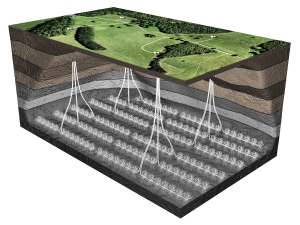
The UK's Department of Energy could ban shale gas 'fracking' if measures to prevent earthquakes fail. Image courtesy Statoil
The UK Department of Energy and Climate Change (DECC) warned the first company to explore for shale gas in the UK that its operations in the vast Bowland basin near Blackpool will be shut down permanently if methods to mitigate earthquakes from hydraulic fracturing, or ‘fracking’, fail.
Cuadrilla Resources, a joint venture between Australian drilling firm AJ Lucas and private equity firm Riverstone, announced on 21 September that the Bowland sedimentary rock basin in Lancashire, for which it holds shale gas exploration licenses, holds a total potential resource of 200 trillion cubic feet of gas, or more than ten times existing UK natural gas reserves.
The firm was forced to halt drilling in May, however, after the British Geological Survey (BGS) concluded that shale gas fracking had likely caused two small earthquakes off the Fylde coast near Blackpool, northwest England.
The BGS reported the epicentre of an earthquake with a magnitude of 1.5 on 27 May was located just 500 metres from a shale gas well site, while due to the shape of its wave form an earlier 2.3 magnitude earthquake on 1 April was also likely to be related to shale gas drilling.
Cuadrilla will now meet DECC on 13 October to present its detailed geomechanical and seismicity study into its operations and how the risk of earthquakes can be minimized. DECC will evaluate the report in tandem with BGS before it will allow Cuadrilla to resume drilling, according to Toni Harvey, a senior geoscientist at the UK government department.
“I assume that Cuadrilla will come up with some recommendations for methods to predict earthquakes, like for example a mini well falloff test before they do a big frack that may have created an earthquake,” said Harvey, speaking at this week’s Unconventional Gas conference in London. “I hope Cuadrilla will perform tests to mitigate that risk [of earthquakes],” she added.
Harvey said Cuadrilla’s operations will be shut down once more if these methods do not reduce the risk of earthquakes. “If we allow fracking to continue and their mitigation didn’t work, then we would shut them down again, without a doubt. There is a lot of concern in the media and ministers about public safety.”
Harvey said that in the other places where a relationship between fracking and earthquakes had been observed, such as Arkansas and Dallas Fort Worth in the United States, there had been a mixture of different operations, such as injectional wells of large amounts of disposal fluids. In Blackpool, however, there has been just a single ‘frack’, suggesting a link was probable.
Understanding the geomechanics of hydraulic fracturing is one of the most challenging aspects of geology, according to Kirk Sherr, managing director of energy consultants Regester Larkin North America, and attributing specific causality of earthquakes was not straightforward. “It is an area of considerable uncertainty among geologists specializing in geomechanics,” he said.
Professor Denis Peach, the BGS’ chief scientist, said: “It’s very early days and there’s a long way to go with the science. There has been one fracking incident. One swallow doesn’t make a summer.”
Discussion
Trackbacks/Pingbacks
Pingback: Campaigners Tell Cuadrilla to Frack Off | Frack Off - October 13, 2011
Pingback: Frack Off (London) put pressure on in the big city | Frack Off - October 13, 2011
Pingback: Shale gas in the UK: Why Chris Huhne is not screaming “Frack, baby, frack!” « millicentmedia - October 21, 2011
Pingback: Will fracking save the world? | Scholars and Rogues - October 27, 2011
Pingback: Will fracking save the world? - OIL WORLD 2011 – OIL WORLD 2011 - October 27, 2011
Pingback: Will fracking save the world? | Alternative Propulsion Energy - October 27, 2011
Pingback: British Geological Survey: Cuadrilla’s shale gas estimate unreliable, to release new figure « millicentmedia - November 2, 2011
Pingback: Campaigners Tell Cuadrilla to Frack Off | What The Frack? - November 7, 2011